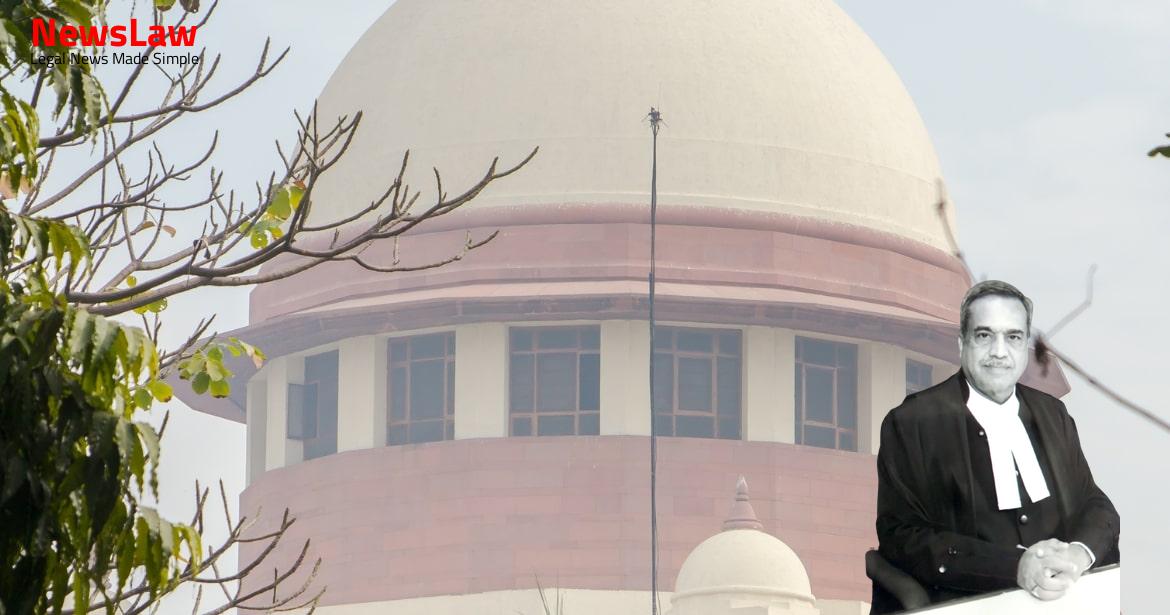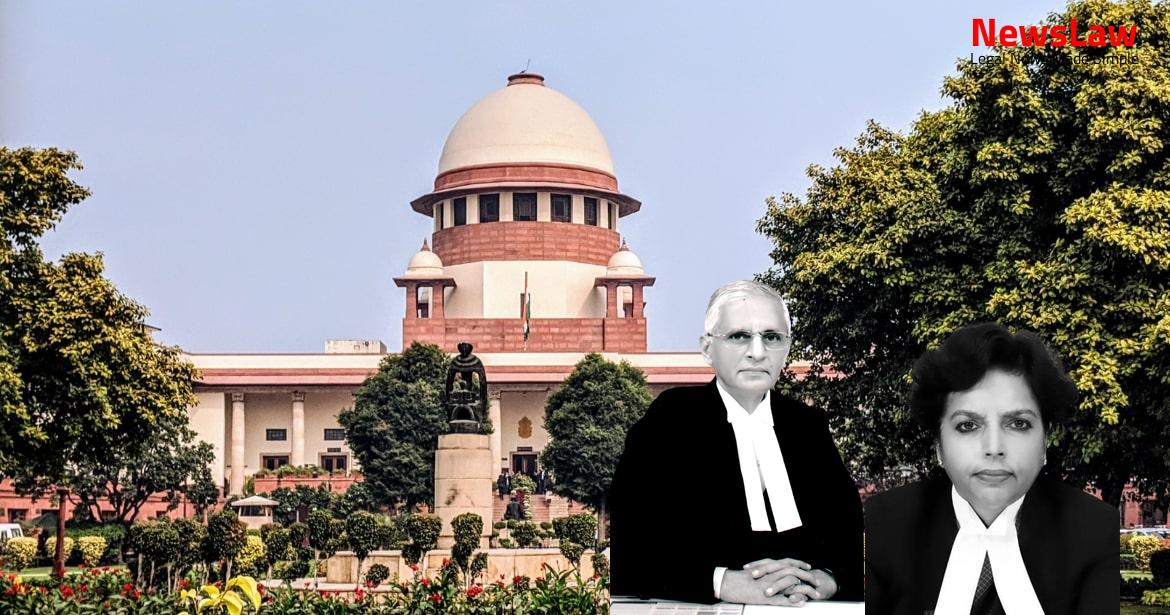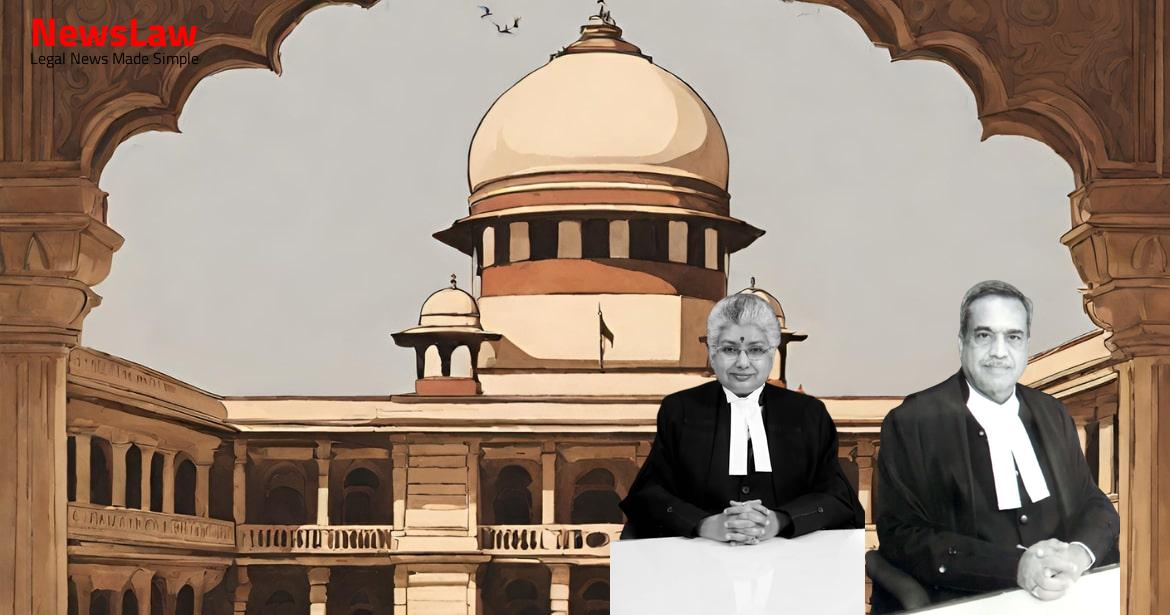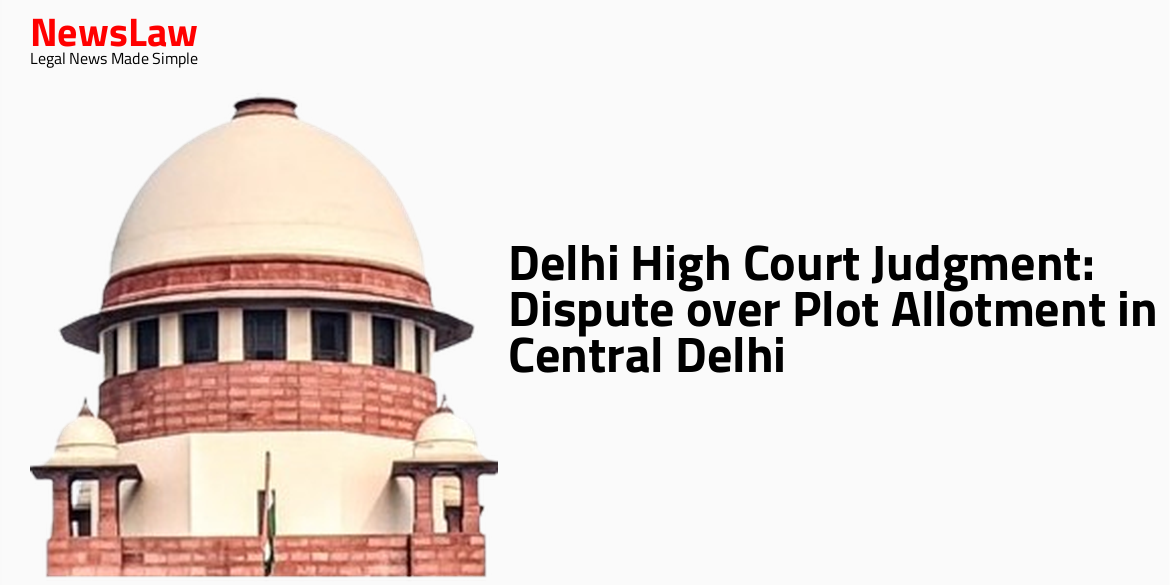Delve into the intricate legal analysis conducted by the court in a recent case involving the balance of powers between constitutional authorities. The case sheds light on the importance of upholding democratic principles while ensuring accountability and transparency in judicial processes. Follow the nuanced examination of these critical issues in our detailed summary.
Facts
- A complaint was filed against Mr Sudip Jain and other EC officials under Sections 269, 270, and 304 read with Section 120-B of the Indian Penal Code at Khardah Police Station.
- The EC banned rallies, public meetings, and street plays between 7 pm and 10 am during the campaign days.
- The respondent filed a writ petition at the Madras High Court seeking fair counting of votes at the 135-Karur Legislative Assembly Constituency.
- An IA for amendment was filed challenging an earlier order of the High Court, which has now merged into the final order.
- The EC approached the Supreme Court challenging an order dated 30 April 2021 by the Division Bench of the Madras High Court.
- The respondent had sent representations to the EC regarding COVID-19 safety precautions during vote counting.
- The EC issued letters to political parties emphasizing COVID-19 protocol adherence during elections.
- The EC filed a counter-affidavit detailing steps taken for pandemic management during the poll processes.
- The High Court made oral remarks attributing responsibility to the EC for the second wave of COVID-19.
- The High Court entertained a writ petition under Article 226 of the Constitution regarding COVID-related protocols at polling booths in the Karur Legislative Assembly Constituency in Tamil Nadu.
- During the hearings, the Division Bench allegedly attributed responsibility to the Election Commission (EC) for the surge in COVID-19 cases due to failure in implementing appropriate safety measures during elections.
- The EC claimed these remarks tarnished their image as an independent constitutional authority.
- The EC filed a miscellaneous application seeking reliefs.
- The High Court disposed of the petition on 30 April 2021 based on measures taken by the EC for COVID-19 protocol compliance during vote counting in the 135-Karur Constituency.
- On 26 February 2021, the EC announced general elections for several Legislative Assemblies.
Also Read: Electoral Malpractices in Mayor Election
Issue
- A delicate question of balancing the powers of two constitutional authorities in this appeal
- Larger issues of the freedom of speech and expression of the media
- The right to information of citizens
- The accountability of the judiciary to the nation
Also Read: Balancing Power and Transparency: Electoral Bonds Struck Down, Disclosure Mandated
Arguments
- The High Court made disparaging oral observations about the EC regarding the second wave of COVID-19, without relevance to the specific issue before the court.
- The observations were made without giving the EC an opportunity to explain the steps taken for COVID-19 protocols during the elections.
- The High Court disposed of the writ petition without addressing the miscellaneous application filed by the EC.
- The EC’s wide-ranging powers during elections were highlighted, including the ability to deploy forces and replace officers.
- Media reporting suggesting courts cast aspersions on individuals or authorities was deemed incorrect.
Also Read: Recall of Resolution Plan Approval: Legal Analysis
Analysis
- The judicial system is based on the principle of open access to courts to protect constitutional freedoms.
- The High Court’s oral remarks are not officially recorded, hence cannot be expunged.
- The EC’s request to restrain media from reporting court proceedings infringes on open court principles and freedom of speech.
- Different courts globally facilitate public viewership of proceedings via live streaming or open access methods.
- Technology can aid but not substitute the necessity for open court proceedings.
- The absence of records for oral proceedings hampers transparency and accountability in the legal system.
- Judicial language should uphold constitutional values and dignity.
- Judges utilize language and exchange of views to arrive at just outcomes based on law and justice.
- Investigations in Kolkata can be addressed through legal remedies under the Code of Criminal Procedure, 1973.
- The role of High Courts as appellate and writ courts emphasizes the importance of open and transparent judicial processes.
- Public discourse and media reporting play a crucial role in maintaining the integrity of the judiciary and promoting justice.
- The use of technology, including social media, in reporting court proceedings is an extension of freedom of speech and expression.
- Judicial proceedings should be conducted transparently to ensure accountability and public trust in the judiciary.
- Balancing the rights of media, individuals, and entities with the responsibilities of the judiciary is essential for democracy to thrive.
- The judiciary must remain independent, impartial, and accountable to the public in its actions.
- Public scrutiny and reporting on court proceedings are vital for transparency and accountability in a democratic society.
- While exceptions exist for closed court proceedings in exceptional circumstances, public scrutiny of the court process is essential for democracy.
- Freedom of speech and expression, including media reporting on court proceedings, is guaranteed under Article 19(1)(a) of the Constitution.
- Public hearings and media reporting serve as checks on judicial conduct and promote transparency in the judicial system.
- Technology, including social media, has revolutionized the dissemination of information about court proceedings and the functioning of democratic institutions.
- The Court strongly supports the freedom of the media to report court proceedings.
- The media plays a crucial role in ensuring transparency and accountability in the judicial system.
- Freedom of the press is essential for upholding principles of democracy and the rule of law.
- Reporting on court proceedings helps educate the public and promote understanding of the legal process.
- Any restrictions on media coverage of court cases must be carefully justified and balanced against the principles of openness and access to justice.
Case Title: THE CHIEF ELECTION COMMISSIONER OF INDIA Vs. M.R. VIJAYABHASKAR (2021 INSC 286)
Case Number: C.A. No.-001767-001767 / 2021



